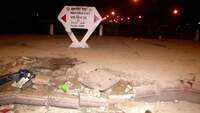
GUWAHATI: The publication of the National Register of Citizens (NRC) has served a body blow to Barpeta's Taffajul Ali. He has not only found himself excluded from the final list after being included in the draft NRC, the land and the house documents he could have shown to a foreigners' tribunal might just prove to be useless. The reason? This year's floods washed away both Ali's land and his house, leaving this resident of Koemari village in lower Assam homeless, landless and now potentially stateless.
"What will happen now? I had furnished all the necessary documents but the floods took away my land and my house. I now have only the documents, not the land or the house. What if the foreigners' tribunal doesn't accept them any more?" said Ali.
Ali - who recently moved to a new area in Koemari after the Beki river washed away everything he owned - suspects that someone from the village might have complained against him before the NRC authority, leading to his name being dropped from the final list.
"After the floods took away everything, I was forced to move to a nearby location. I suspect someone from there filed an objection against me and that's why my name was dropped," Ali said.
Ali now has to convince a foreigners' tribunal - a quasi-judicial body especially set up to solve matters of dubious citizenship - that his documents are genuine.
Shahjahan Ali, an foreigners' tribunal lawyer from Barpeta, said, "First, a claimant has to collect a certified rejection order from the NRC authorities citing why his or her claim was rejected. Then, the claimant needs to prepare the documents within 120 days."
The lawyer also said the Supreme Court should monitor the disposal of claims in the tribunals. "There is need for a Standard Operating Procedure (SOP) for these bodies to deal with such cases. If there is no SOP, there will be chaos," he said.
"What will happen now? I had furnished all the necessary documents but the floods took away my land and my house. I now have only the documents, not the land or the house. What if the foreigners' tribunal doesn't accept them any more?" said Ali.
Ali - who recently moved to a new area in Koemari after the Beki river washed away everything he owned - suspects that someone from the village might have complained against him before the NRC authority, leading to his name being dropped from the final list.
"After the floods took away everything, I was forced to move to a nearby location. I suspect someone from there filed an objection against me and that's why my name was dropped," Ali said.
Ali now has to convince a foreigners' tribunal - a quasi-judicial body especially set up to solve matters of dubious citizenship - that his documents are genuine.
Shahjahan Ali, an foreigners' tribunal lawyer from Barpeta, said, "First, a claimant has to collect a certified rejection order from the NRC authorities citing why his or her claim was rejected. Then, the claimant needs to prepare the documents within 120 days."
The lawyer also said the Supreme Court should monitor the disposal of claims in the tribunals. "There is need for a Standard Operating Procedure (SOP) for these bodies to deal with such cases. If there is no SOP, there will be chaos," he said.
Trending Topics
LATEST VIDEOS
More from TOI
Navbharat Times
Featured Today in Travel
Quick Links
Lok Sabha Election Schedule 2019Lok Sabha Election NewsDelhi Capitals teamMI team 2019Rajasthan Royals 2019RCB team 2019Maharashtra Lok Sabha ConstituenciesBJP Candidate ListBJP List 2019 TamilnaduShiv Sena List 2019AP BJP List 2019Mamata BanerjeeBJP List 2019 MaharashtraPriyanka GandhiBJP List 2019 KarnatakaAMMK Candidate List 2019BJP List 2019 WBLok Sabha Elections in Tamil NaduBSP List 2019 UPNews in TamilLok Sabha Poll 2019Satta Matka 2018PM ModiMahagathbandhanNagpur BJP Candidate ListChandrababu NaiduTamil Nadu ElectionsUrmila MatondkarNews in TeluguMadras High CourtTejashwi YadavArvind KejriwalTejasvi SuryaPawan KalyanArvind KejriwalYogi AdityanathJaya PradaSatta King 2019Srinagar encounter
Get the app







